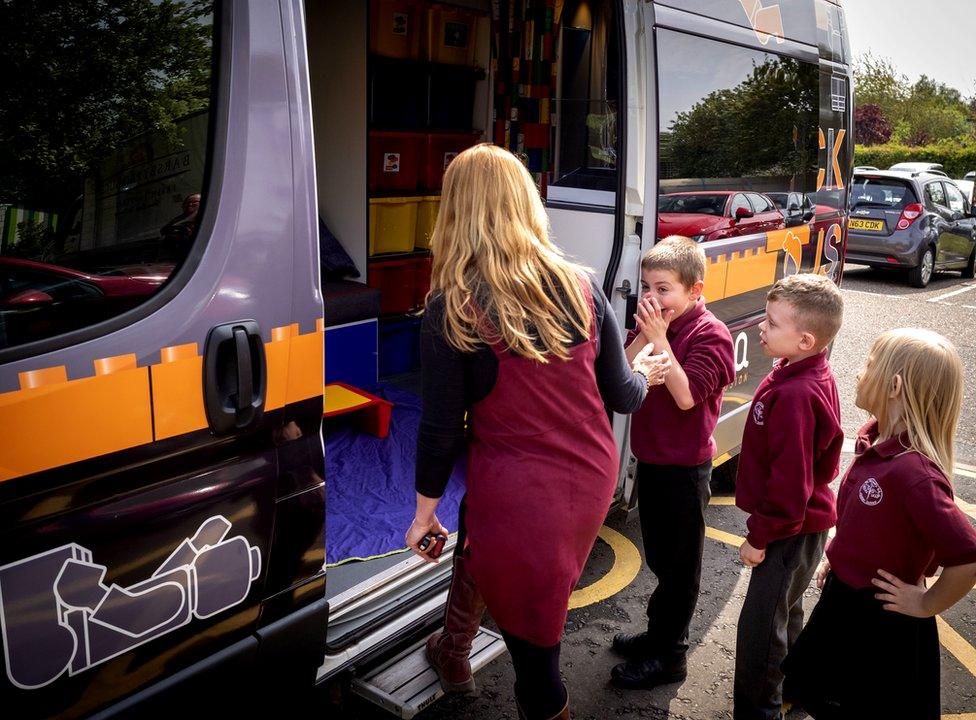Communicating brick-by-brick
- Published

The Block Bus, a mobile learning unit, founded by Amy Eleftheriades, provides communication therapy to children in rural communities.
Through building-block activities, the children are introduced to social skills and communication techniques.
We spent the day looking at the work of Amy and her team.
Mentor Caryn sets the scene with toy sharks on a blue mat. It's shark-infested water. The challenge is to get across, unharmed.
"I'm a building machine, I can build anything," says Oliver after he tells everyone about the Lego mechanism he has designed.
He has built a speedboat with not one, but three "distracter blasters".
One will launch fish at the sharks, the second is a net which will capture the sharks too busy feasting to notice and finally - as they sail safely past - a special serum will destroy the net and release the sharks back into the wild.
Amy, Jordan and Oliver sit and listen to Caryn's instructions
This is the first time Amy, Jordan and Oliver have been on board the Block Bus and to them it seems like a play centre on wheels.
Containers full of different types of building blocks tower above them. Cuddly toys are placed on the sofa and Jordan grabs a monkey which he nestles next to him. Sensory lights create a calm mood - this is a safe and inviting space.
The children get comfortable on the mat. Caryn's instruction is to build a tower.
"Same instruction, different models. We all think a little bit differently and that's OK," Caryn says, as all three get to work and create something completely different.
The organisation which runs the Block Bus, Alpha Inclusion, uses Lego therapy and building blocks to help children between the ages of five and 16 improve their social communication, interaction and personal effectiveness. They provide small group sessions as well as working with individuals.
Originally an American invention, Lego therapy was created to help children with autism and learning difficulties to develop their communication skills, but it is now used more widely.
The Block Bus travels about and can park up to create an accessible environment for all.
Currently covering East Anglia, Alpha Inclusion works with about a dozen schools regularly, and has worked with many more to train staff to work with children. The Block Bus also visits local events and festivals.
Founder Amy Eleftheriades has worked in this field for more than 20 years.
"Over the years I have found that Lego can be tricky for some children and they need to start on a more basic level," she says.
"Some children can't necessarily manipulate the Lego and so we find out their interests, and use that to engage with them. We might use arts, clay or play. It depends on the child."
Alpha Inclusion has been working with St Michael's voluntarily aided junior school for more than a year. They work closely to understand the needs of the individual child, and train teaching assistants to enable them to reproduce the work they do.
"Underlying everything we do is children's mental health and wellbeing," says Mrs Helen McCarney, who has been head teacher at the school for 15 years. "If you cannot tackle that they cannot learn."
Lego therapy is an accessible mechanism for intervention and it isn't used just for autism.
Mrs McCarney explains that activities with Lego help the children open up and talk about their problems. These interventions also help some children engage with the wider curriculum.
Alpha Inclusion also works with children who are close to exclusion, re-engaging them and improving their home-school relationships.
"It's really powerful," says Mrs Kath Brabbin, the school's Special Educational Needs Coordinator (SENCO).
"We had a girl last year who was refused by another school, but with the help of Amy and Caryn she is now in school and attending lessons."
Mrs Brabbin and Head Teacher Mrs McCarney
"We work with the needs rather than the label," Amy says. "People believe in us, and it's meant that they have gone above and beyond."
The Block Bus doesn't just help children. Amy and her team also use it for corporate work including team-building activities, wellbeing sessions, communication skills, development training and autism awareness.
Profits generated are reinvested to assist in delivering services for education, health and social care.
Back in the bus Caryn asks the children to build something with four pieces and then pass it on. Oliver places his four pieces down and passes it to Jordan. He watches on, but seems concerned to see the structure change.
Caryn notices and asks: "Are you OK Oliver, you seem a bit upset by how Jordan has changed the barn?" Oliver takes a moment to think before he replies: "I'm OK with it because we are all putting our ideas together."
"Sometimes children don't like to go out of class, and be seen to be different. So if you can say to them 'we are going to go and do something with Lego', it feels like play. It's not like doing work," says Mrs Brabbin.
"It's like a lesson outside. The children turn around and say 'we didn't have class today'."
For Amy this is just the beginning.
"This is our first year and we are still learning," she says. "But in my head we have a whole fleet of double-decker buses."
Written by Maria Nicola with photographs by Phil Coomes.